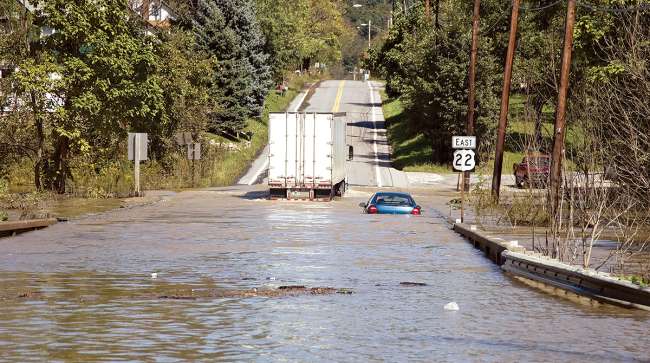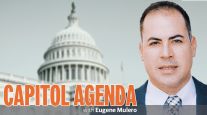Senior Reporter
Experts Advocate Infrastructure Funding, Reforms at House Hearing

[Stay on top of transportation news: Get TTNews in your inbox.]
Significant upgrades of freight and commuter corridors would vastly improve motorists’ quality of life and regional commerce, a panel of infrastructure experts told a congressional panel Sept. 25.
The country’s busiest transportation networks experience various degrees of congestion, hindering the flow of freight in vast metropolitan regions. State agencies struggling to alleviate congestion as well as prepare for severe weather events would benefit from reliable federal assistance, they said.
D+. That’s how @ascetweets rated America’s overall infrastructure. As we think about building the America of the future, we need infrastructure investments today. pic.twitter.com/80Gk1yTK4d
— House Budget Committee (@HouseBudgetDems) September 25, 2019
“Providing adequate investment for our infrastructure now will have profound economic benefits. Improved infrastructure will spur economic activity that will benefit America’s public safety, health and welfare, as well as the [gross domestic product], jobs, personal income and businesses,” said Carol Haddock, director of Houston Public Works.
She spoke before the House Budget Committee, also as a representative of the American Society of Civil Engineers. Haddock suggested policymakers craft a forward-looking infrastructure measure that would prioritize building sustainable and severe weather-resilient projects.
Also, policymakers must modernize water resources systems, facilitate emerging technologies such as autonomous vehicles, improve land use planning, and support research and development into innovative infrastructure materials.
The group, a proponent of raising federal fuel taxes to boost funding for transportation and infrastructure networks, gave the country’s overall infrastructure a D+ grade in 2017.
“Infrastructure is the foundation that connects the nation’s businesses, communities and people — driving our economy and improving our quality of life. For the U.S. economy to be the most competitive, we must have a first-class infrastructure system,” Haddock added, in prepared remarks.
While funding would be crucial, Adie Tomer, fellow with the Metropolitan Policy Program at the Brookings Institution, emphasizes a rethink of the country’s infrastructure priorities to accommodate current needs, such as broadband and climate change.
“With sustained commitment to a reform effort and an open-minded, outcome-driven approach, I’m confident Congress can deliver infrastructure reform that will support a more inclusive, competitive and resilient country in the decades to come,” Tomer said.

Geddes
Economic competitiveness, environmental resilience and upgrading outdated frameworks should be addressed by policymakers as they seek to advance comprehensive legislation, he explained.
Richard Geddes, founding director of the Cornell Program in Infrastructure Policy at Cornell University, agreed the country faces challenges in funding and financing projects. He also argued that delivering projects would be enhanced through a streamlining of the National Environmental Policy Act, or NEPA, process.
“There is widespread agreement that the process requires reform. For example, a highway project may require 10 different federal agencies considering 16 separate permitting decisions to obtain approval. State and local governments often have their own permitting requirements,” said Geddes, noting a “one federal decision” approach to permitting. That approach is a provision in a recent Senate highway reauthorization bill.
The experts on Sept. 25 were the latest stakeholders to come before Congress advocating for meaningful action on infrastructure policy. Since the start of the year, Democrats in control of the House and Republicans managing the Senate have held dozens of panels to review and evaluate potential policy points. These have included safety concerns along highways, passenger and freight railroads, the trucking industry and autonomous technologies.
In advance of tomorrow's Budget Committee hearing on infrastructure, take a moment to learn about the basics of the Highway Trust Fund
Read More here: https://t.co/S3NyR1yVkU pic.twitter.com/t1VpY9yBfV — House Budget GOP (@housebudgetGOP) September 24, 2019
The looming insolvency of the Highway Trust Fund, an account backed by dwindling revenue from the gas and diesel tax, also has been the subject of congressional hearings. Despite broad acknowledgment on Capitol Hill on the need to ensure the fund’s long-term solvency, or otherwise adopt an alternative source of funding for significant transportation systems, transportation leaders fail to agree on a path forward.
WANT MORE NEWS? Listen to today's Daily Briefing
House Democratic leaders and President Donald Trump sought to address infrastructure funding policy at the start of the year, while Senate leaders said they would wait for guidance from the president. Negotiations between Speaker Nancy Pelosi (D-Calif.) and Trump ended in May. The prospect of revisiting those talks seem unlikely after Pelosi on Sept. 24 announced the start of a formal impeachment inquiry of Trump.
Congress has not raised the 24.4 cents-per-gallon diesel tax and 18.4 cents-per-gallon gas tax since 1993.




